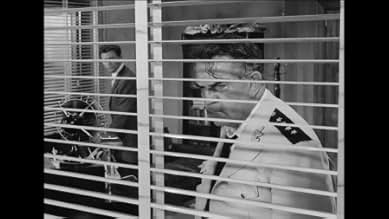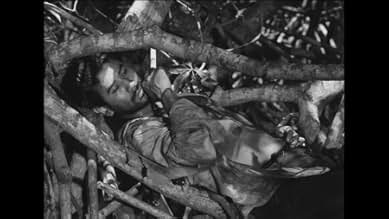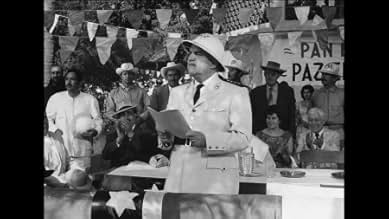Aroused citizens assassinate an unpopular Caribbean despot, then two men vie for his gorgeous widow Ines. Ojeda is a steamy, isolated island, the penal colony for an oppressive dictatorship.... Read allAroused citizens assassinate an unpopular Caribbean despot, then two men vie for his gorgeous widow Ines. Ojeda is a steamy, isolated island, the penal colony for an oppressive dictatorship. A reactionary seizes the murdered governor's post and rushes to eliminate his romantic ri... Read allAroused citizens assassinate an unpopular Caribbean despot, then two men vie for his gorgeous widow Ines. Ojeda is a steamy, isolated island, the penal colony for an oppressive dictatorship. A reactionary seizes the murdered governor's post and rushes to eliminate his romantic rival, an idealistic underling. The bureaucrat Vazquez hopes to marshal the angry residents ... Read all
- Inés Rojas
- (as Maria Felix)
- Le gouverneur Mariano Vargas
- (as M.A. Ferriz)
- Le lieutenant García
- (as Raoul Dantes)
- Manuel
- (uncredited)
- Le procureur
- (uncredited)
- Le ministre Sáenz
- (uncredited)
- Le juge
- (uncredited)
- Le chauffeur transportant Inès Rojàs
- (uncredited)
Storyline
Did you know
- TriviaIn his memoirs, Buñuel claims to have plagiarized the plot of this film from Puccini's opera "Tosca".
- Crazy creditsHalf of the credits are displayed at the beginning of the film: the first seven member of the cast, director, writers, director of photography, composer, conductor, production companies, and executive producer. The closing credits display the other half (after the word "FIN"): Once again the cast list but this time the first eight actors, then the assistant director, script supervisor, unit manager, sound engineer, production manager, followed by the name of the dubbing facilities and laboratories.
- ConnectionsReferenced in Gérard Philipe: un homme pas un ange (2003)
The film - which would eventually be remade for French TV in 1993 - is perhaps best-remembered today for being the swan-song of its popular, handsome and talented leading man, Gerard Philipe, who died of cancer that same year at the young age of 36! Bunuel, having met him on the set of Yves Allegret's THE PROUD ONES (1953), had long wanted to work with the French star and, over the next few years, had unsuccessfully tried to set up adaptations of THE MONK (eventually filmed in 1973 with Franco Nero from Bunuel's own script) and THE HORSEMAN ON THE ROOF (filmed in 1995 from long-term Bunuel collaborator Jean-Claude Carriere's script) for this purpose! Though Philipe's customary sprightly charm was not required by the sullen premise anyway, the effect of the illness can be seen in his gaunt features and especially the character's own psychological/physical torment during the movie's latter stages. The fact, then, that the subject of a possible future with the heroine is often breached (but, sensibly, not attained) during the course of the film makes the whole all the more poignant. Incidentally, his naïve idealism is such that he even allows himself into an executive position, serving bosses that are always intrinsically corrupt. Actually, he is berated for this by his former mentor, now a political prisoner in the penal colony of El Pao. Even when Philipe becomes acting Governor himself, he has to answer to the State President (shown in just one scene as having more consideration for his prize horse than the nation he purports to lead) and, in a society stifled by bureaucratic red tape, the most subversive act of rebellion he can muster is to tear up the paperwork!
Philipe is wonderfully supported by Maria Felix, the most famous Mexican actress, who had previously worked in Italy in the somewhat hysterical 1951 peplum MESSALINA and in France, for Jean Renoir, on FRENCH CANCAN (1954). Here she portrays the despotic Governor's sultry but unloving wife. The former's murder at his birthday celebrations - in which famished peasants rush towards the tantalizing slabs of meat on defiant display - sets the narrative in motion; his successor (the splendid Jean Servais of RIFIFI [1955] fame) is equally despicable and soon he too embarks on a masochistic relationship with Felix (metaphorically essayed in a bullfighting scene where a matador is gored to death as one is wooing the other). Actually, Felix had fallen for Philipe (after the customary initial friction pertaining to class structure) and she dutifully intercedes on his behalf with the suavely sadistic Servais (at one point, he humiliatingly has her disrobe in his office!). Indeed, the director inserts his usual quota of sexual tension (involving Felix and the various men in her life) into an already ironic and twist-laden narrative: Philipe and Felix 'organize' a prison revolt for which they hope Servais will be blamed and expelled from office but, really, he had secretly planned it all along so as to eliminate the political prisoners! The central couple then think of leaving the island for good but Philipe, guilt-ridden over the futile massacre, has second thoughts...which leads to Felix perishing in a car explosion while fleeing a checkpoint; finally, Philipe (a fervent political activist off-screen) condemns himself by wilfully disobeying his superior's orders.
The end result is the director's most overtly political film but also his least favorite among those he shot in the French language! Even so, it is aided immeasurably by frequent collaborator Gabriel Figueroa's harsh monochrome photography - a trademark of Bunuel's Mexican period; the film, in fact, can pretty much be seen as a companion piece to his more readily enjoyable DEATH IN THE GARDEN (1956), similarly a French co-production set on an island beset with political turmoil and, like that film, it also benefits from a notable musical score by Paul Misraki.
Even if I watched REPUBLIC OF SIN on a 40" TV screen, a lot of the time I could not keep up with the Italian subtitles (though my having studied French at school helped and the plot was, in any case, not all that difficult to follow) - while my Pioneer DVD had intermittent playback issues by freezing between chapters and occasionally letting out a deafening screech!
- Bunuel1976
- Oct 13, 2010
- Permalink
Details
- Release date
- Countries of origin
- Languages
- Also known as
- Nestrpljenje raste u El Pasu
- Filming locations
- Production companies
- See more company credits at IMDbPro
- Runtime1 hour 37 minutes
- Color
- Sound mix
Contribute to this page






























